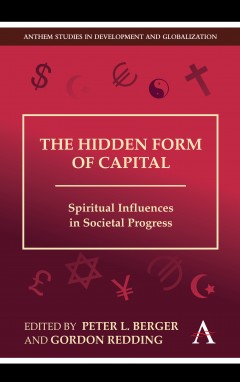The Hidden Form of Capital
Spiritual Influences in Societal Progress
Edited by Peter L. Berger & Gordon Redding
- About This Book
- Reviews
- Author Information
- Series
- Table of Contents
- Links
- Podcasts
About This Book
'The Hidden Form of Capital' presents evidence from several parts of the changing world about how the realm of the spirit affects the economy. The idea that societies have economic cultures as well as aesthetic, literary, and artistic cultures is well-embedded in a number of major studies attempting to identify the origins of national wealth and progress. This book provides an original contribution to the debate, by discussing the relationship between religion and the economy not via further theoretical speculation, but through the presentation of analytical evidence from real-life case studies in Europe, Asia, Africa, Russia, and the United States.
There is currently a major re-assessment of assumptions about the foundations of societal progress, as the market rationality model is exposed for its moral weaknesses. The emergence of socio-economics as a scholarly field, as well as the embracing of complexity theory and the societal effect in economic analysis, brings the question of cultural effects to the forefront. This collection of studies offers more practical and tangible evidence, especially unique and useful for its comparative aspect. The book skilfully combines this comparative and descriptive character with an accessible writing style intended for a wide audience.
Reviews
'A significant and timely contribution to the longstanding debate of the role of religion in economic progress.' — Michael A. Witt, Professor of Asian Business and Comparative Management, INSEAD
'There has to be an explanation of economic growth that takes into account the spiritual as well as the purely economic and political aspects of society… This book adds much to understanding this most significant of questions.' —Bruce W. Stening, Vlerick Dean, National School of Development, Peking University
'This book adds to and develops Weber's ideas, which are usefully expanded across countries, religions, and time. It shows also how spiritual capital is not always religious and can be negative as well as positive.' —Chris Rowley, Professor of Human Resources Management, City University, London
Author Information
Peter L. Berger has been Director of the Institute on Culture, Religion and World Affairs at Boston University for the past twenty years, and has had a formative influence on both the study of sociology and its application to religion.
Gordon Redding is a specialist on the comparison of alternative systems of capitalism and their societal roots; he has spent 24 years at the University of Hong Kong, and now continuing to research on Asia at INSEAD.
Series
Table of Contents
Contributors; Preface; Introduction: Spiritual, Social, Human, and Financial Capital; Do Some Religions Do Better than Others?; Spiritual Capital and Economic Development: An Overview; The Possibilities and Limitations of Spiritual Capital in Chinese Societies; How Evangelicanism - Including Pentecostalism - Helps the Poor: The Role of Spiritual Capital; Flying under South Africa's Radar: The Growth and Impact of Pentecostals in a Developing Country; Importing Spiritual Capital: East-West Encounters and Capitalist Cultures in Eastern Europe After 1989; Orthodox Spiritual Capital and Russian Reform; Islam and Spiritual Capital: An Indonesian Case Study; Separating Religious Content from Religious Practice: Loose and Tight Institutions and their Relevance in Economic Evolution
Links
Stay Updated
Information
Latest Tweets



